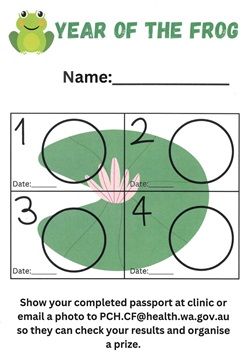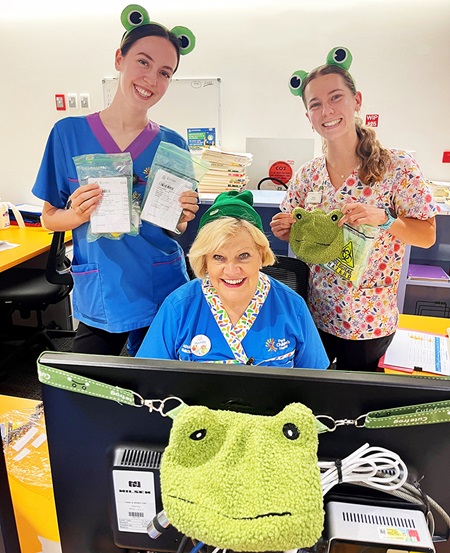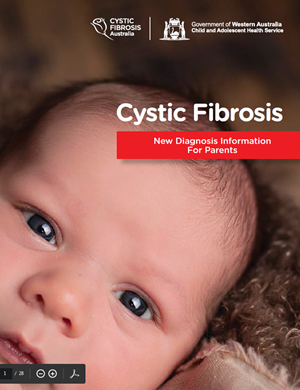Cystic Fibrosis - For patients and families
Year of the Frog - Take the Leap Forward
This year we are aiming for four sputum samples from you over 12 months.
Click the links below to help you get started.



Send in your first ever sputum sample or reach four samples this year and you will receive a PRIZE! For more information see below.
Have you seen our NEW Frog Passports?
To help you remember when it’s time to submit your sputum sample, we have developed a Frog Passport which PCH are handing out at clinic visits. Be sure to collect one at your next appointment. Each time your child submits a sputum sample, PCH will stamp their passport. When your child has filled their passport, they will be eligible for a reward from Cystic Fibrosis WA. Make sure you ask at your next clinic appointment.

How do I find out my sputum sample results?
It takes 3-5 days for the sample to be processed and results to be available.
Please email your CF nurses at pch.cf@health.wa.gov.au to see if any results are available. If it is close to your clinic date, please ask at your appointment.
Frog (CF) clinic
When you see you CF clinic team check out our new frog merch. We think it’s pretty FROGtastic!

Like what you see? By providing a sputum sample regularly you may be lucky enough to receive your own frog merch! Talk with your clinic physiotherapist to find out more.
Resources
These are the resources that we recommend to our patients and families who are at different stages of their cystic fibrosis (CF) journey.
Preparing for your child's bronchoscopy
Resources
Information about nebulisers
Although the pari boy nebuliser can be noisy, we want to reassure families that it is a fast and effective way to deliver medications used for the care of people with CF.
Recently Pari has improved the LC sprint nebuliser handset. It now includes a ‘PIF control’ system. You will know if you have one of these handsets as ‘PIF’ is written on the handle. The PIF control system is a breath sensory feedback system that automatically slows the airflow to the patient. This means that if you or your child breathe in too quickly, it will limit the amount of air flow through the chamber – this will feel like resistance and you may think it is not working. If this happens, slow down your breathing and use a ‘long slow breath in'. Long, slow, controlled breaths in will result in more effective drug deposition and a quicker delivery time. In fact, pari boy sprint will deliver the medication much quicker than some of the newer portable mesh devices.
Helpful resources
Monitoring children with cystic fibrosis
Our specialised cystic fibrosis team at PCH will monitor the progress of cystic fibrosis management and aim to optimise your child's care. This Health Fact sheet details the routine and annual reviews that patients can expect.
Monitoring children with cystic fibrosis (PDF 394kb)
Bronchoscopies for monitoring young children with cystic fibrosis
More information on why the cystic fibrosis team at PCH recommend bronchoscopy for monitoring younger children with cystic fibrosis.
Bronchoscopies for monitoring in young children with cystic fibrosis (PDF 255kb)
Medication pre-ordering form
Use the CF Pre-ordering form to order your routine, ongoing medications and have them ready to pick up before or after your hospital appointment.
Medications that are not included on this form, such as periodic or specific medications will need to be requested in clinic.
How to use this form
- Individually select the medications you need the drop down boxes
- Once all fields are completed, you can either 'Save' or 'Email' the form
- Make sure that you submit before 11am the Monday before your next clinic appointment
- If you are unable to collect your medications, please call PCH Pharmacy on (08) 6456 0190.
Download CF Pre-ordering Form (PDF 1.3mb)
Cystic fibrosis and incontinence
Did you know that girls with CF can experience urinary incontinence? Whilst urinary incontinence (the loss of bladder control) is a condition experienced by millions of people around the world, it occurs more frequently in girls with cystic fibrosis. Even some boys with CF experience loss of bladder control but this in similar numbers to that of their peers.
The severity of symptoms ranges. It usually starts with occasionally leaking a few drops of urine (wee) when coughing, sneezing or laughing. In girls with CF, coughing is the most frequent cause of leakage.
During chest infections when you are coughing more, there is a greater risk of leakage or increased amount of leakage. We did a study of adolescent girls with CF in our clinic and 33% percent reported some type of leakage. This compares to 3.5-5 % in similar aged girls without CF. It also appeared that girls who cough frequently are more at risk of developing these symptoms.
The good news is that we can do something about it. The first step is to talk to your clinic physiotherapist or someone in the team. Physiotherapists can prescribe strategies and exercises to prevent and improve symptoms. In our study, the girls who participated were easily able to learn ‘the knack’ to control their bladder and said it wasn’t embarrassing. Next time you are in clinic, feel free to discuss the topic further with your clinic physio or one of the team.
Urinary incontinence and cystic fibrosis - Health Fact sheet (PDF 688kb)
Cystic fibrosis and mental health
Parents and carers are likely to experience high levels of stress and distress associated with the daily demands of caring for a child with CF.
Children with chronic medical conditions such as CF are more at risk of developing depression and anxiety compared to their healthy peers.
We have developed an information sheet titled CF and mental health: what psychologists need to know, to assist community psychologists in supporting these families.
Cystic fibrosis and mental health - what psychologists need to know (PDF 281kb)
Newly diagnosed
For parents of newly diagnosed children, Cystic Fibrosis WA and CAHS have developed a guide.

Download this guide here (PDF 1.95MB)
Fact sheets
Procedures and treatment
Health Fact sheets
Procedures
Intravenous access
Infection control
What to bring for hospital admissions
Please bring the following items to hospital when you’re being admitted:
- List of your child's current medication
- Physiotherapy equipment including all nebuliser pots
- Nebuliser units, if they are due for servicing
- Enclosed/running shoes
- Gym clothes
- Drink bottle
- Comfort items i.e toys, blankets, books etc.
Find out more about coming to stay in hospital.
What to bring to respiratory clinic appointments
Please bring the following items to each respiratory clinic appointment:
- List of required medications
- Physiotherapy equipment including a sachet of HTS and Ventolin if your child uses this for physiotherapy
- Sputum sample from the day of your clinic appointment.
Annual review
If you are due for your annual review, please remember to bring these additional items:
- Nebuliser units to allow for annual servicing
Please drop off your nebuliser unit for servicing as soon as you enter the hospital to the Equipment and Consumable Service (ECS) located on Basement Level 2 (Green Lifts) near the underground carpark. Please let ECS staff know that it is a CF service. This will ensure you keep your own machine and the service is completed and ready for pick up after clinic.
2. Nebuliser pots
3. Physiotherapy equipment
Download the Annual Review letter (PDF)
Medications
You can pre-order your medications and collect from the PCH Pharmacy on the day of your outpatient clinic appointment.
How to... Health Fact sheets